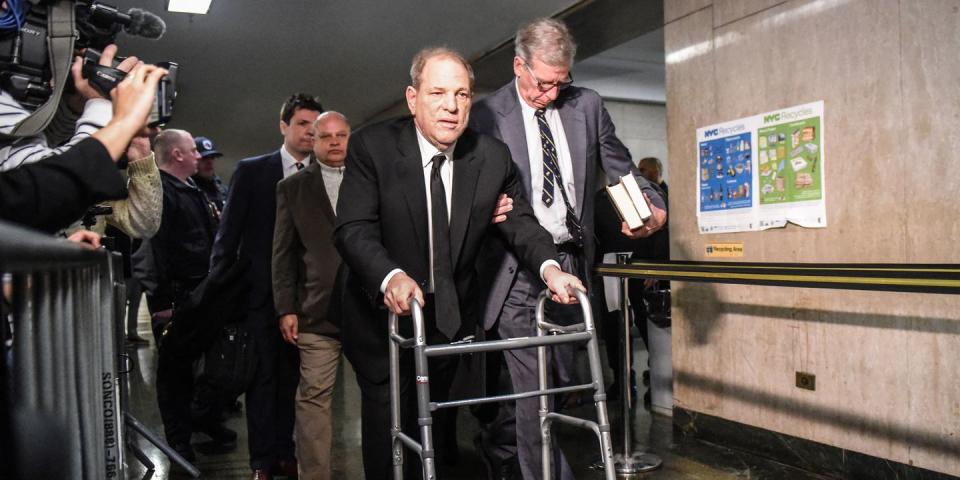Debunking Every Rape Myth Raised in Harvey Weinstein's Trial
Jury deliberations began last week in the rape trial of disgraced movie mogul Harvey Weinstein, who faces life in prison if he's convicted of the most serious charges against him. He has pleaded not guilty in the case and denies all accusations of nonconsensual sexual activity.
The tumultuous Manhattan proceedings have been both a press blitz and a serious social reckoning: Outside the courthouse, dozens of women in black lace blindfolds—meant to symbolize the invisible ways in which institutions perpetuate gender-based violence— protested transnational violations of women’s rights with a powerful performance piece.

Inside the courthouse, skepticism about sexual violence took center stage. This wasn't surprising given the history of rape prosecution in America. According to The Washington Post, less than one percent of rapes result in felony convictions, despite the fact that the "consequences of sexual assault fall overwhelmingly on the victims."
At every turn, the survivors' conduct came into question. Weinstein's defense team called expert witnesses to testify about things like the “false memory theory” and what an "authentic" reaction to being raped looks like. ELLE.com spoke with psychologists Dr. Joan Cook and Dr. Anne DePrince about the pervasive sexual assault myths raised during the trail, and why they're harmful for survivors. Cook is a psychologist and associate professor at Yale University who researches traumatic stress, and DePrince is a psychology professor at the University of Denver whose research focuses on the consequences of violence against women and children.

Myth: "Memories fade"
Weinstein’s defense largely hinged on discrediting the survivors' claims. A cognitive psychologist was called to testify about false memories and the ways in which information and news coverage can warp how we remember traumatic events. Is the false memory argument a myth?
Cook: "While memories may fade around the edges, in general, people do not spontaneously wake up and forget traumatic memories or have them distorted way out of proportion."
DePrince: "The central details, that is, the details that a survivor's brain is focused on during trauma, tend to be remembered well. The details that the brain was not focused on may not have been encoded into memory at all or, if they were encoded, may not be remembered well or may fade over time. When survivors describe remembering what happened to them very vividly, their reports are in line with research on human memory. For example, events that evoked emotions tend to be more vividly remembered than events that didn’t evoke emotions."

Myth: Survivors can't act "normal" after being assaulted
Weinstein’s lawyers tried to discredit accounts from survivors by claiming they appeared “OK" after being assaulted. A former friend of Jessica Mann, a key accuser, reportedly testified that Mann seemed “normal” after Weinstein allegedly forced oral sex on her. Is there such thing as an authentic or normal reaction after rape?
Cook: "In the immediate aftermath of a trauma experience—whether that event is combat, terrorism, natural disaster or sexual assault—people may appear 'fine,' but don’t feel fine. Trauma is psychically jolting. It rocks your world. And while many people recover after a traumatic experience, the vast majority experience significant mental health symptoms immediately or shortly thereafter. Whether they are in a state of shock, or feel like things are surreal, or are trying to make sense of the experience because it was so jarring, or whether they are trying to hold it together until they can go home and cry and scream. I never like to compare traumas, but sexual trauma packs a wallop like no other. The probability of one having subsequent mental health difficulties is much higher with this type of trauma than any other. Why? It’s so personal, so demeaning, and often at the hands of ones we trust who betray us. It permeates one’s physical and emotional boundaries."
DePrince: "Unfortunately, there are lots of myths about rape, including the myth that victims will necessarily have visible injuries or appear emotionally distraught to anyone who sees them. The reality is that people vary greatly in how they respond to traumas like sexual assault. Some sexual assault survivors cry, others dissociate, numb out, or freeze up. It’s not how a victim appears afterwards that makes it rape or not. It's what the offender did."

Myth: Women should take responsibility for assault
In an interview with The New York Times, Weinstein lawyer Donna Rotunno said she has never been sexually assaulted because she would never put herself in a position to be sexually assaulted. Then, Rotunno argued that victims of sexual assault should take equal responsibility for what happened to them. Should women accept blame for not being careful enough?
Cook: "This is such an outdated, inaccurate myth. I am so sad that we are still, in 2020, engaging in such character-blaming and assassination. People aren’t sexually assaulted because of something they did or didn’t do. The responsibility for a sexual assault rests in the perpetrator. Spouting these kinds of inaccuracies is very harmful for trauma survivors. For the past 20 years, I have had the privilege of helping survivors heal. Sadly, they internalize these kinds of inaccuracies and can develop deep self loathing because of it."
DePrince: "Sexual assault happens in all kinds of situations and in all kinds of relationships, from brief relationships to long-standing ones to work relationships to marriages. To hold women responsible for avoiding all of the possible situations and relationships where sexual assault might occur doesn’t make any sense, and it puts blame in the wrong place. What a victim does before, during, or after a sexual assault has no bearing whatsoever on whether and why sexual assault occurred. Sexual assaults happen because of what offenders do."

Myth: Survivors had a “choice”
In closing arguments, Rotunno said: “In their universe, women are not responsible for the parties they attend, the men they flirt with, the choices they make to further their careers, the hotel room invitations, and the plane tickets they accept.” What are the biggest misconceptions when it comes to the relationship between power, sexual assault, and control?
Cook: "No one would choose to be raped. No one. To insinuate that someone wants to be raped, that they signed up for it, is insulting. No one would sign up to experience such a deeply personal and harmful violation, and suffer for possibly the rest of their lives with trust issues, nightmares, flashbacks, shame, among other mental health difficulties. Unfortunately, most trauma survivors do blame themselves for things that they did or didn’t do at the time of a traumatic event. In the case of a woman being raped by a man after they were out drinking at bar, a woman might psychologically beat herself up and say to herself, 'It’s your fault the assault happened. You shouldn’t have been drinking.' But many of us drink, at times a little more than we should, and we don’t deserve or asked to be raped. It is not our responsibility or fault if we get raped."
DePrince: "There aren’t laws governing whether women can go to parties or flirt. There are, however, both federal and state laws against raping and sexually assaulting people. Focusing on whether women go to parties or get on planes is a distraction from holding offenders accountable who break the law by sexually assaulting and raping other human beings. This also reminds me of questions people often ask about 'why women stay' in abusive relationships. The short answer is that women have all sorts of reasons for the many decisions they make in life. But, it’s the wrong question. Instead, we should be asking: Why do people sexually assault other human beings? How do we hold offenders accountable and prevent people from becoming sexual offenders?"

Myth: Accusers are opportunists
Weinstein’s lawyers also worked to discredit his accusers' claims by arguing they engaged in consensual sexual relationships with him to further their careers. Is this a common tactic in sex crimes cases?
Cook: "False claims of sexual assault are extremely rare. Coming forward and revealing that you were sexual assaulted can bring tremendous consequences from people not believing you or minimizing your experience, judging you for being at the wrong place at the wrong time, and blaming you."
DePrince: "Sexual assault has long been one of the most under-reported crimes, which isn’t surprising when survivors can see from newspaper headlines across the country how commonly those who come forward are disbelieved or blamed. It’s important to recognize the bind that women face. If they delay coming forward, they get told when they do: ‘We don’t believe you because you didn’t come forward right away.’ But coming forward right away doesn’t protect them from getting judged as opportunists. The problem isn’t women coming forward. The problem is sexual assault."
These interviews have been lightly edited and condensed for clarity.
You Might Also Like

